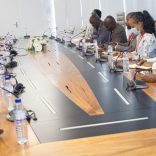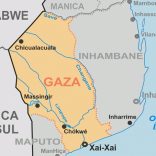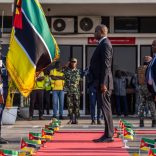Mozambique: Minister claims that 2026 justice congress is crucial for “inclusive dialogue”
Period for submitting lists of candidates begins

CNE spokesperson Paulo Cuinica. [Photo: O País]
The period for political parties contesting the parliamentary and provincial elections scheduled for 15 October to submit their lists of candidates began on Tuesday, and will continue until 1 August.
To receive the large amount of paperwork expected, the National Elections Commission (CNE) has opened an additional office in Maputo’s Joaquim Chissano Conference Centre.
CNE spokesperson Paulo Cuinica said that everything is ready for the CNE to accept candidates’ nomination papers without problems. “We are prepared and we have great expectations that all the parties who have registered will present their lists of candidates on time”, he said.
The first party to submit its lists was the previously unknown Central Party of Mozambique, which planned to run candidates in eight parliamentary constituencies, including Maputo City.
Clearly the PCM had not read the rules. A CNE member checking the lists submitted, Rodrigues Timba, told reporters that the PCM’s lists were rejected because they did not contain enough candidates.
“They just submitted five candidates for Maputo City, which does not correspond to the number of seats for the city”, Timba said. “So we gave them back the files they brought, and we expect that, in the coming days, they will bring us the complete files”.
Any party wishing to stand in a parliamentary constituency must present a list with enough names to fill every seat in the constituency, plus at least three supplementary candidates. Failure to do so means automatic rejection of the list.
CNE chairperson Abdul Carimo made this clear in a meeting with representatives of political parties on 21 June.
Maputo City has been allocated 13 parliamentary seats – so any party wishing to stand there must submit the names of at least 16 candidates. It is always wiser to submit the names of more supplementary candidates, just in case some of the full candidates are disqualified.
39 parties and coalitions registered with the CNE to participate in the elections, but only the three parties currently represented in parliament – the ruling Frelimo Party, the former rebel movement Renamo, and the Mozambique Democratic Movement (MDM) – can be regarded as serious contenders.
A couple of new organisations might make an impact – Nova Democracia (“New Democracy”) has been set up by Salomao Muchanga, the former chairperson of the Youth Parliament, which has played a dynamic role in various civil society initiatives.
PODEMOS (Party of Optimists for the Development of Mozambique) was thought to stand a chance when it was linked to the name of Samora Machel Junior (“Samito”), the son of the country’s first President, Samora Machel. But Machel Junior has publicly dissociated himself from Podemos, and its chances of winning any seats must now be regarded as very slim.
The other contestants are political parties in name only. They have few members, few votes, and most of them have no offices, no publications and no websites. They are invisible between elections, appearing every five years in an attempt to claim some of the money that the state distributes to parties competing in general elections.












Leave a Reply
Be the First to Comment!
You must be logged in to post a comment.
You must be logged in to post a comment.